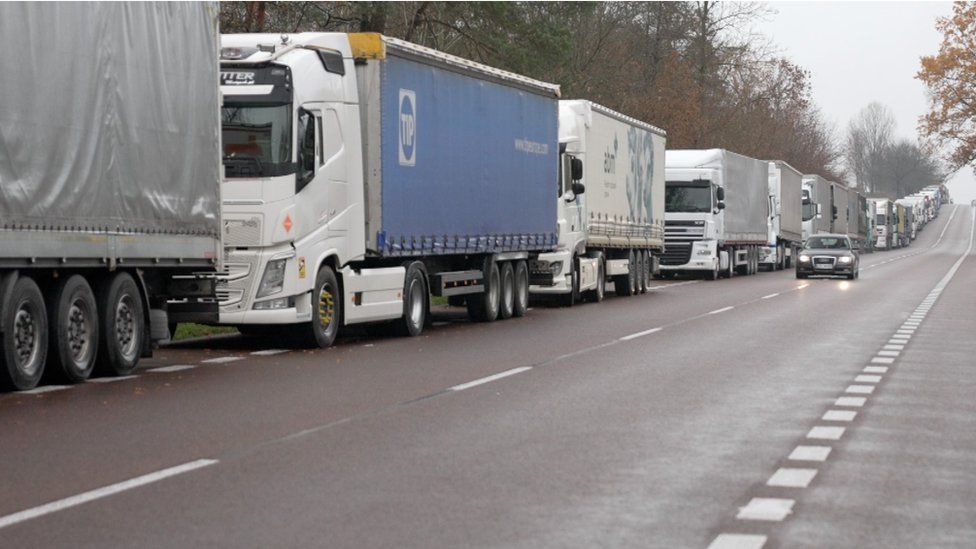
By Sarah Rainsford in Dorohusk
Eastern Europe correspondent
The queue of trucks starts more than 20 kilometres from Poland’s eastern border.
Hundreds of Ukrainian lorries are parked along the road in an unbroken line, caught up in a trade dispute that’s putting new strain on Polish-Ukrainian relations.
At Dorohusk and other key crossing points, where Ukrainian refugees once poured across to a warm welcome, Polish truck drivers now block the road with their cabs in both directions, choking the flow of traffic.
Humanitarian and military aid are waved through into Ukraine, as is perishable food and livestock.
Everything else gets stuck.
Ukraine’s ambassador to Poland has called the hauliers’ protest a “stab in the back” from a country that has been a close ally ever since Russia launched its full-scale invasion.
Ukrainian drivers have been sleeping in their cabs for over a week, waiting to cross, and are running out of supplies, money and patience.
On Friday, they said they were advancing towards the crossing at about a kilometre a day.
But Polish truckers manning the roadblock were equally frustrated and forthright.
They said they were forced into this extreme step to protect their livelihoods after the EU lifted all entry restrictions on Ukrainian carriers.
It did that soon after the war started.
“I think the EU wanted to help Ukraine, and that’s fine. But it didn’t really think through the fact that Ukraine would take over our markets,” the chairman of the strike committee in Dorohusk, Pawel Ozygala, told the BBC.
Image source, BBC/Matthew Goddard
Pawel Ozygala says his business has been heavily affected by the lifting of restrictions on Ukrainian carriers
He estimated the cost to his own firm in lost business at around €100,000 (£88,000; $109,000) since the start of the war, because Ukrainian companies were undercutting him.
“We support Ukraine, but we need to support our own families too. It’s a matter of ‘to be or not to be’ for our companies now.”
Behind him, a banner on the front of a cab set out the Poles’ conditions.
Top of the list was reintroducing a permit system to cap the number of Ukrainian trucks entering Poland.
Polish firms say the vast majority of trade has been taken by Ukrainians since the passes were abolished by Brussels.
They also want changes to the online queue system for trucks leaving Ukraine, saying the current set-up favours locals.
Until all that happens, the protesters are letting just one Ukrainian truck an hour into Poland, and a couple the other way.
The Ukrainians aren’t impressed.
“I’d like to thank our brotherly Poles for this suffering,” Stanislav Timoshchuk told the BBC, saying he’d already waited for seven days. He added that he and his fellow drivers “probably smell like dogs”.
At the current rate of progress, he may cross the border to Ukraine in a fortnight.
Image source, BBC/Matthew Goddard
Stanislav has been waiting a week to cross back into Ukraine and it could take him another two weeks
“There are air raids in my town every night, my family are there and I’m stuck here,” he pointed out. “So if you don’t like us being here, just let us go home!”
Stanislav was returning to Ukraine with a load of paper from Berlin, after delivering wood.
He argued that such work was helping support Ukraine’s economy, funding the weapons and ammunition it needs to go on resisting Russia.
Poland’s government supported that cause from the start, though it had a big wobble ahead of last month’s election.
The prime minister said then that Poland would send Kyiv no more weapons, and the president likened Ukraine to a drowning man, dragging others down with it.
Analysts agreed they were trying to lure voters from Confederation, the far-right Ukraine-sceptical Polish party that’s now publicly backing the truckers’ protest.
The politicians were also looking for support from farmers, angry about cheap Ukrainian grain hitting the Polish market.
The government’s talk has since pivoted back to being more positive.
But in the village nearest the protest, people admitted that their own sympathies had faded.
“We’ve had enough. We helped enough,” Anna told us, over her garden fence in Okropy, though she couldn’t be more precise about what exactly she was tired of. “I supported the Ukrainians at first, but it’s been too long.”
“Times are hard now in Poland, so there’s obviously less sympathy,” a pensioner called Zofia agreed.
The lights of the truckers’ picket were just visible across the fields behind her.
Image source, BBC/Matthew Goddard
Polish drivers want caps to be placed on Ukrainian trucks entering the country
The organisers have permission to protest until January and official negotiations have made no progress yet.
But there are hints that the mood on the ground is worsening.
Pawel Ozygala showed us photos of a truck he said was one of his fleet queueing in Ukraine, which had its lights smashed.
On the Polish side, police cars dot the length of the queue.
But Stanislav, the Ukrainian driver, is already low on fuel, food and water and the temperature outside is dropping.
“Some people here are starting to lose it. Their nerves are right on edge. Thanks Poland, for this help.”

